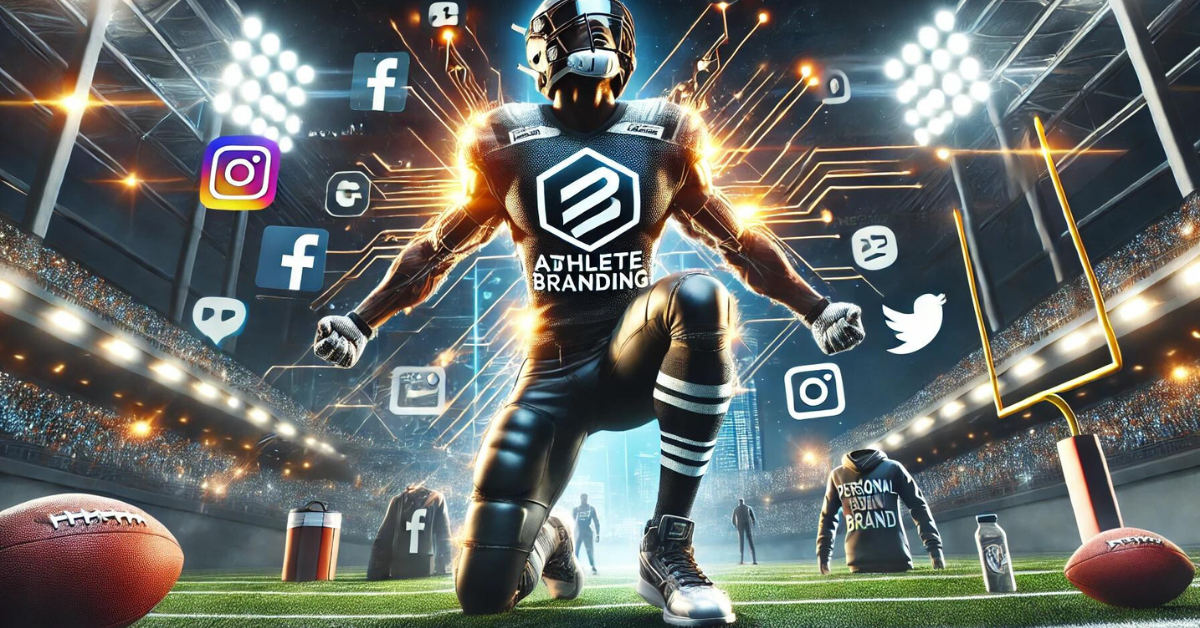In the world of sports, an athlete’s success isn’t just measured by their performance on the field or court. Today, an athlete’s brand has become just as important. Athlete branding refers to the process of creating and managing an athlete’s public image, allowing them to connect with fans, attract sponsors, and build a lasting legacy. In this article, we’ll explore what athlete branding entails and why it’s crucial for athletes in today’s competitive environment.
What is Athlete Branding?
Athlete branding is the practice of developing a unique and recognizable identity for an athlete, both on and off the field. It goes beyond athletic performance and focuses on how the athlete is perceived by the public, fans, and sponsors. By cultivating a personal brand, athletes can share their story, values, and personality with the world, making them more relatable and marketable.
Key components of athlete branding include:
- Authenticity: The athlete’s brand should reflect who they are, both in their sport and personal life.
- Consistency: A strong brand is consistent across all platforms, from social media to interviews and public appearances.
- Engagement: Interacting with fans, sharing personal insights, and providing behind-the-scenes content helps athletes build a loyal following.
Why Is Athlete Branding Important?
Building a strong athlete brand is more important than ever. Here are several reasons why:
- Increased Earning Potential: A well-established brand can lead to lucrative endorsement deals, sponsorships, and partnerships. Companies are more likely to invest in athletes who have a clear brand identity that aligns with their values and target audience.
- Longevity Beyond Sports: An athlete’s career in professional sports can be relatively short. However, by building a strong brand, athletes can create opportunities that extend beyond their playing days, such as launching businesses, becoming brand ambassadors, or pursuing media careers.
- Fan Engagement: Branding allows athletes to build deeper connections with their fans. By sharing their personal stories, goals, and values, athletes become more relatable and develop a loyal fan base.
- Control of Public Image: An athlete’s public image is shaped by both their actions and the media. By managing their own brand, athletes can take control of how they are perceived, ensuring their narrative aligns with their goals and values.
How to Build a Strong Athlete Brand
Building an effective athlete brand takes strategy, consistency, and effort. Here are some key steps athletes can take to establish and grow their personal brand:
- Define Your Brand: Start by identifying the key elements of your personal story, values, and personality. What sets you apart from other athletes? What message do you want to share? These questions can help define your brand identity.
- Leverage Social Media: Social media is one of the most powerful tools for building a personal brand. By engaging with fans, sharing behind-the-scenes content, and providing updates on your career, you can grow your following and establish yourself as a thought leader in your sport.
- Collaborate with Brands: Partnering with brands that align with your values can enhance your brand’s credibility. Choose collaborations that feel authentic and that resonate with both you and your audience.
- Stay Authentic: Fans and sponsors appreciate authenticity. Make sure your brand reflects who you truly are, both as an athlete and a person. Staying true to yourself will help build trust and a loyal fan base.
Examples of Successful Athlete Branding
Many athletes have successfully built their brands, turning them into household names. Here are a few examples:
- LeBron James: LeBron’s brand goes far beyond basketball. Known for his philanthropy, business ventures, and outspoken activism, LeBron has built a brand that reflects his values on and off the court.
- Serena Williams: Serena’s brand is all about empowerment, strength, and perseverance. Through her sports achievements, fashion ventures, and advocacy for gender equality, she has established herself as a global icon.
- Cristiano Ronaldo: With millions of followers on social media, Ronaldo has leveraged his brand to create endorsement deals and business opportunities. His brand is synonymous with excellence, fitness, and luxury.
Athlete Branding and Sponsorships
Sponsorship deals play a major role in an athlete’s financial success. Brands want to align themselves with athletes who have a strong and positive public image. By building a solid brand, athletes make themselves more attractive to sponsors who are looking for influencers that match their target demographic.
Moreover, an athlete with a strong brand can command higher fees for endorsements and partnerships, increasing their overall earning potential. Sponsors are willing to invest in athletes who have a large and engaged following, as it helps boost their brand’s visibility and credibility.
The Role of Media in Athlete Branding
Media plays a critical role in shaping an athlete’s brand. From traditional media outlets to digital platforms, athletes are constantly in the spotlight. Managing media relationships and ensuring consistent messaging across platforms is essential for maintaining a strong brand image.
Social media has also become a key player in athlete branding. Athletes can directly communicate with their fans, share their personal stories, and showcase their values. By carefully curating their social media presence, athletes can ensure their brand remains strong and authentic.
Conclusion
In today’s competitive sports environment, athlete branding is more important than ever. A strong personal brand not only increases an athlete’s earning potential through sponsorships and partnerships but also helps them create a lasting legacy that extends beyond their career. Whether you’re a young athlete just starting out or a seasoned professional, building a personal brand is essential for long-term success in the sports world.
FAQs
What is athlete branding?
Athlete branding refers to the process of creating and managing a unique and recognizable identity for an athlete that extends beyond their athletic performance.
Why is athlete branding important?
Athlete branding is important because it helps increase earning potential, build stronger fan engagement, and create opportunities beyond an athlete’s playing career.
How can athletes build a strong brand?
Athletes can build a strong brand by defining their values, using social media to engage with fans, staying authentic, and collaborating with brands that align with their identity.
What are examples of successful athlete brands?
LeBron James, Serena Williams, and Cristiano Ronaldo are examples of athletes who have built powerful brands that transcend their respective sports.








